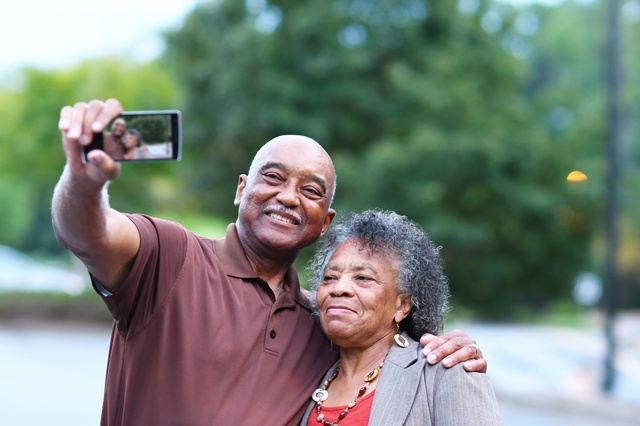Social health benefits

Social health is how we build and maintain good relationships with others. It helps us connect with people in our communities and society. We do this through communicating effectively, being flexible and understanding each other.
The quality of our overall adult social well-being is interconnected with all these things. Our mental and emotional well-being depend on the relationships we form with other people. As humans, we naturally desire to be close to others. We need and want to connect and build relationships.
In this article, we will explore the many social health benefits of our mental health and physical health. We’ll see how being socially connected and having supportive relationships can lead to better mental and physical health outcomes. It also helps us handle stress, anxiety, sadness and depression better.

Why is social health important?
The benefits of social health depend on our relationships with family, friends, coworkers and our communities. Let’s look at three examples of social heath.
Here are some examples of the different types of connections we can have with others and their social health benefits:
- Intimate connections are with people who love and care for you, like your spouse, relatives and friends. These relationships have the biggest impact on your social well-being. Some simple, but important, ways to maintain and nurture these connections include:
- Make time to communicate with loved ones. This helps maintain strong relationships. Be open about your feelings and needs.
- Going to family events can help strengthen your relationships. It’s important to show excitement and interest in what your relatives are doing. This can make your family relationships stronger.
- To prevent conflicts from escalating into unhealthy situations, deal with them promptly. Talk to your loved ones in a calm and neutral space to find a solution. If the conflict becomes too overwhelming to handle alone, consider seeking counseling.
- Relational connections are with people you see regularly or share an interest with, like coworkers, neighbors, a hairdresser or babysitter. Here are some ways to keep these relationships healthy:
- Remember their birthdays or other personal details to show that you think of them.
- Share your interests or important changes in your life to build trust in the relationship.
- Collective connections are with people who have something in common with you, like being part of the same church or having the same political beliefs. You could grow these relationships by:
- Respecting and understanding the social norms of the group to build trust.
- Participating in events and offering to help out to show that you are interested in connecting with these people. Show that you care about what they do both inside and outside of the group.
- Working together on projects to get to know them better.
To improve your adult social well-being, it is important to build and maintain meaningful and long-term relationships in these three areas to deepen your social health benefits. Think about the relationships you have with people and the ones you would like to have. You might find you want to make new friendships while also strengthening existing relationships.

How can your relationship with others have a positive effect on your well-being?
Positive social connections have a strong impact on our physical health and mental health. Research from around the world has shown this link for many years. The benefits of healthy relationships can greatly improve our lives in several ways. We become happier and more content, and we even live longer with a stronger sense of well-being. Studies also have shown that while we’re enjoying these benefits, we’re projecting the positive effects on relationships around us, too. For example, when we feel good about our social connections, we open a unique feedback “loop” of positive social, emotional and physical well-being.
According to researcher and author Emma Seppala, who wrote “The Happiness Track,” feeling connected to others has many advantages. It boosts our self-esteem and increases our empathy for others. It also makes us more trusting and cooperative overall. As a result, Seppala says, people are more likely to trust and cooperate with us.
In other words, the benefits of healthy relationships have a positive ripple effect. When we have strong social connections, people want to spend time with us. And they, in turn, will continue the feedback loop on their own.
Researchers have proven this theory by studying so-called Blue Zones around the world. These places have many people who live long and healthy lives while maintaining excellent cognitive function. Factors related to diet and lifestyle might be different from one Blue Zone to the next. However, all of these “SuperAgers” were highly socially active. In many places, SuperAgers were constantly surrounded by family and community members who actively supported them. One example of this is the isolated island of Ikaria in Greece.
Similar trends have been observed closer to home, too. A study in “Psychology and Aging” showed that older adults who live a socially active life and prioritize social goals are more satisfied in later life. The study also found that staying socially active, despite health challenges, can reduce and delay late-life decline.
It’s important to have a social network that includes a variety of different types of relationships. These can include friendships, associates and romantic interests. People in healthy relationships tend to:
- Listen to each other and communicate without judgment.
- Trust and respect each other.
- Consistently make time for each other.
- Remember details about each other's lives.
- Engage in healthy activities together.
- Work well as a team.
- Be disciplined. People in healthy relationships don’t treat their partner poorly just because they are close.
- Be healthy and whole on their own.
- Avoid focusing on what they want to get from the other person. Instead, focus on how the relationship can be mutually beneficial.

Why is social interaction important to humans?
Humans need close connections with others to be socially healthy. We’re born into social groups and live our whole lives as a part of society. Being able to connect and socialize with others, especially within a core group, is critical to our well-being. In fact, research suggests humans are innately compassionate. The importance of social interaction to human health can be measured through this. By nature, we are social creatures. Our capacity to care and share runs deep. Thus, our instinct is to seek the company of others to build mutually satisfying relationships.
Social interaction is so important to human health that some experts call it “a vaccine” against stress and anxiety. Having direct contact with others releases neurotransmitters such as oxytocin that lower stress. Simply shaking someone’s hand or giving someone a high-five is enough to trigger a response. Being around other people also encourages us to maintain healthful habits. For example, when we socialize with nonsmokers and moderate drinkers, we’re less likely to smoke or drink excessively. Connecting with people who encourage us to be mindful of our lifestyle shows the importance of social interaction to human health.
The benefits of social interaction go far beyond positive peer influences. Being socially connected can greatly improve our outlook on life. It can change how we handle conflict, treat ourselves and look out for others. Being socially connected helps reduce the harmful effects of stress and give our lives meaning and purpose.
Consider this list of 10 benefits of social interaction that allow us to:
- Adapt to social situations.
- Stay true to ourselves in all situations.
- Balance our social and personal time.
- Be engaged with others in our communities.
- Develop and maintain friendships.
- Create boundaries in friendships and relationships.
- Have a supportive network of family and friends.
- Have assertive skills (rather than passive or aggressive ones).
- Treat others with respect.
- Have fun in life!
Keep in mind that it’s not about having a lot of friends. Having good quality relationships is what makes a difference. When we take care of our social well-being, we can recognize when a relationship is not good for us and let it go. This shows that we have higher standards for the people we choose to be close to. Meaningful friendships provide understanding, support and make us feel valued. This makes them stronger and more fulfilling.
Remember: It’s about how connected you feel, not how many friends you have.

What are some examples of social health benefits?
Our health depends on the strength of our relationships. The meaning of social health is our ability to have positive relationships with and interact well with others. It includes communication, empathy and adapting to various social situations.
There are many examples of social health benefits, but a lack of social connections can harm our physical health. People with poor social health often have more stress and inflammation. This can affect every part of the body, including the brain. It can also impact blood flow to organs and weaken the immune system. Chronic inflammation is linked to health problems like arthritis, heart disease and diabetes.
Other health concerns that researchers have linked to poor social health include:
- Heart attacks
- Chronic disease
- Mobility issues
- High blood pressure
- Cancer
- Poor mental health
- Anxiety and depression.
If these examples aren’t enough to convince you of the importance of having strong social connections, let’s look on the flip side. According to the Centers for Disease Control and Prevention (CDC), people with stronger social bonds are 50% more likely to survive than those with fewer social connections. Here are some examples of social health benefits as identified by the CDC:
- Lower rates of:
- Heart disease
- Stroke
- Dementia
- Depression and anxiety
- Improvement in the ability to recover from stress
- Better habits in healthy eating, physical activity and weight management
- Improved sleep habits, well-being and quality of life
- Reduced risk of violent and suicidal behaviors
- Prevention of death from chronic diseases.
As we can see, social connectedness greatly influences our minds, bodies and behaviors. It helps us live longer and have fulfilling relationships. We need these relationships to stay healthy and happy, for ourselves and our loved ones.
RECAP:What are the health benefits of social interaction?
This article explores how social health benefits are related to our overall adult social well-being. We now know how social relationships and health are connected, both mentally and physically. Being socially active should be a priority for our own health, not a chore. Hello4Health, a new initiative from Allina Health, helps people connect with others to develop stronger social connections, improving mental health and physical health.
Here we’ve seen examples of social health benefits and how our relationships with others can have a positive effect on our well-being. So now it’s time to start saying “Hello!”
To learn more about adult social well-beingand connectedness, check out Hello4Health’s online resources and follow us on social media.
